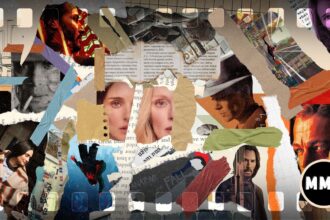As of late, it has come to my attention that the entertainment industry has become overwhelmed with the suffering of Black people. Films such as Jordan Peele’s Get Out and shows like Amazon’s Them, HBO’s Lovecraft Country, and even the most recent season of Umbrella Academy all center around past and present instances of segregation, racism, and police brutality. It seems the new norm of focus in Black entertainment is Black oppression.
Two Distant Strangers tells its story through a similar lens, this time in the form of an endless loop of racial profiling and police brutality. The film follows Carter James (played by rapper Joey Bada$$) as he constantly is harassed by a police officer (Andrew Howard), ultimately resulting in his death; he then wakes up on the morning of his murder and proceeds to repeat the day over and over with no resolution in sight (regardless of what different choices he makes).
Feeling hesitant to watch the film on my own, I chose to join my former college roommate for our first viewing. When the credits hit, we both sat in confusion at the film’s conclusion with the same question etched across our faces: who is the film actually for?
In an interview with Complex Magazine, one of the film’s writer/directors Travon Free stated:
“Even though the story itself is a work of fiction, it’s based on the lives or group of people,” he continued. “So that was important to me that it’d be representative of reality because I wanted people to be like, ‘This really happens?’ If you’ve somehow managed to miss what’s been happening, I want people to see this and go, ‘Well, the police wouldn’t like breaking your door and have the wrong house.’ Oh yeah, they’ve done it multiple times. They do it a lot. And have killed people in many of those instances.”
Though his point is valid, I have to question why he felt as though this was the most effective route to go. I completely understand the intent of this film, and it is slightly successful at shedding light on the chess match of police brutality, but to what avail?
I would argue (and believe that many Black people would agree) that Two Distant Strangers doesn’t do much for the current circumstances African Americans face. The film simply simulates circumstances that have actually happened (or could happen) to any Black person–but that’s it. It does nothing to change a narrative that we already know to be true.
The simple fact is, WE know what’s going on with our people. We see it on social media. We see it on news headliners. We see it in our everyday lives. This being the case, I question the necessity of the film–if the plot, climax, and ending are simply reflections of reality we live in, does it really have a benefit for the community it claims to be supporting?
Two Distant Strangers has received some backlash on social media in regard to the movie’s plot. The truth is that Black audiences are tired of having the same traumas or deaths displayed in a movie or tv show for supposed “entertainment.” After all, cinema can be a place of pure fantasy, yet here we are constantly being fed with the same negative expected outcomes.
So who exactly is this film (and other films like it) for? Much of the entertainment that depicts Black traumas seem intended purely to educate white audiences of the realities their counterparts face–and that’s a major problem. Black people should not have to create films that debase themselves for profit in order for people to see their point of view. There’s nothing that can be proven to those that choose to be blind, and if there is, it shouldn’t be at the expense of repetitive bloodshed, fictitious or real.













Thanks for this interesting review.
I thought “Get Out” was brilliant because it found horror in the tension between assimilation and othering that is a legacy of slavery and Jim Crow. In the post-Obama era, to the villains of Get Out, Black bodies have a certain cache, but are exploited by a system that cares nothing for the souls that inhabit them. Get Out was shocking and fascinating, and, I thought, a fairer reflection of a society that isn’t racist in the same ways as it was but is still fundamentally broken.
This, on the other hand, looks like torture porn; and, as the author points out, it seems redundant when real news stories are worse.
I’d rather see a scifi/fantasy of what it might mean to rethink the police.